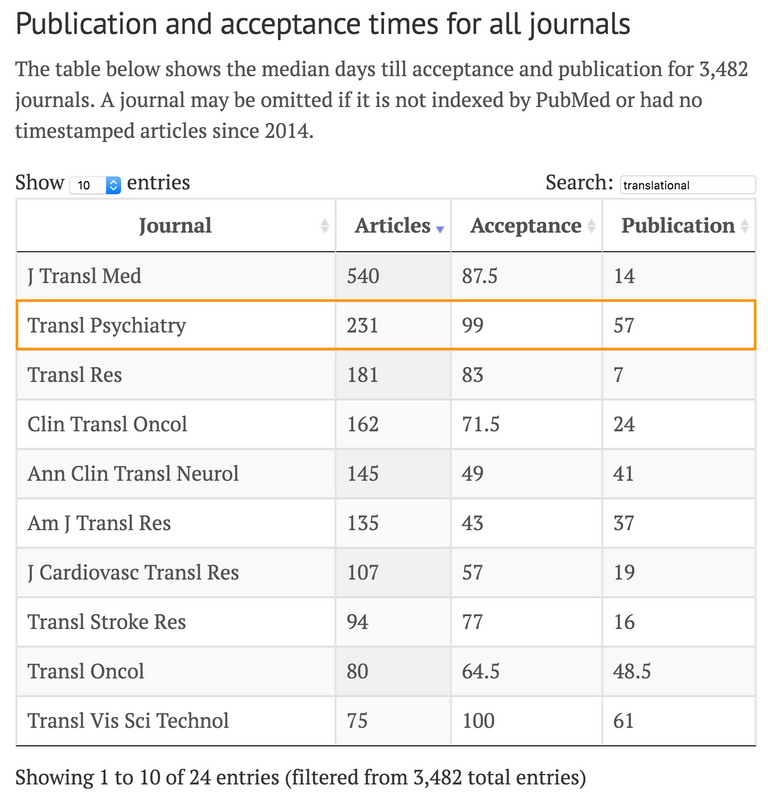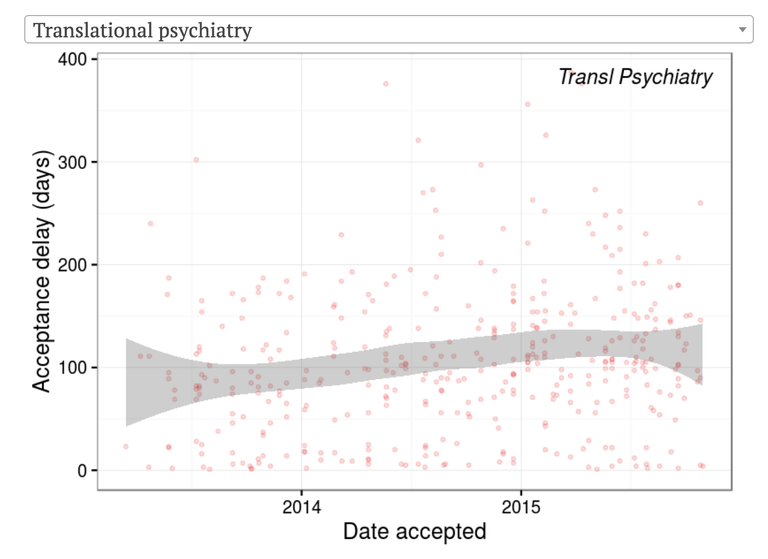(or how to make inefficient use of your time by trying to please eight reviewers)
My modular RNA-Seq paper is finally accepted in Translational Psychiatry. Here is a figure in our paper if you want to take a peek at the framework:

It has been almost a year since 98% of this work was completed. In his 2015 blog post, my colleague @dhimmel analyzed publication delays of over 1.5 million articles. In his table of calculated median acceptance delay (days from receival till acceptance) for all PubMed-indexed journals, Translational Psychiatry showed 99 days:

Well, my particular study took 222 days -- is this a case close to the tail of TransPsych’s violin plot, or is the delay getting worse? In Daniel's follow up post, I was able to interactively enter Translational Psychiatry and see the trend, up until 2016:

I haven’t played with the code, but perhaps when @dhimmel is not giving talks or hiking, he could quickly rerun the analysis with more up-to-date data or delegate this task to his apprentice. For now, allow me to tell you how it took so long to almost-publish my modular RNA-Seq study.
First submission
My first submission of this work was to Biological Psychiatry on August 10, 2017. Early November, after having sucessfully defended my PhD dissertation (#blessed), I received feedback from 5 different reviewers. It bugged me that the editor did not ask for a revision even though the reviews were objectively very positive. We had the option of re-submitting to a completely different journal, repealing the editor’s decision, or transferring the reviews to another journal in the Neuroscience Peer Review Consortium. After discussing with the co-authors, I decided to transfer the reviews to Translational Psychiatry, an open access journal in the consortium. You will see later why this was a wrong move. At the time, we thought five reviewers were a lot, but several comments were solid, constructive and significantly improved the manuscript.
Second submission
Right before my trip back to Viet Nam, I submitted the revised manuscript to Translational Psychiatry on December 4, 2017 after putting a lot of work in digging back into what I was doing 3 months before, reminding myself of many things I did, from data filtering to findings interpretation, adjusting to the new journal’s style, teleconferencing with co-authors, responding to all the reviewers, and getting all co-authors to approve the revision. Don’t get me wrong: the revision process was difficult but absolutely necessary; however, it could have been a lot less time-consuming had I not have to wait 3 months to get reviews. The end product was a higher quality paper and a 25-page long cover letter to the editor of Translational Psychiatry. We crossed over fingers and hope that the editor acknowledged our effort to improve the manuscript and either accept our paper right away, or perhaps request a minor revision.
We had high hopes. Four months later, on April 3, 2018, we received substantial revision request and feedback from three different reviewers, in additional to the five we had. I was infuriated. I wanted to do good science, not please reviewers. Nevertheless, I bit the bullet and completed yet another thorough revision to resubmit. (This process sucked balls - I was still getting my feet wet at Penn during this time.)
Third submission
I submitted the second round revised manuscript on April 30. After 1.5 months of having not heard back, the corresponding author sent an email to the editor to ask for updates. On July 20, we received a minor revision request from one of the reviewers. The other two were happy with the revision. (Thank goodness!)
Fourth submission
Exhausted, I quickly addressed the reviewer’s two concerns and submitted the new version the day after the request, Jun 21. Finally, on July 14, we received an acceptance letter from the editor. I’m expecting approximately 2 more months until my accepted paper appear in Translational Psychiatry.
Conclusion
This post was written mostly as an outlet for my frustration, so I apologize if I bored the heck out of you along the way. I’m just glad the study is finally (going to be) out for the world to see!
Until later!
That sounds frustrating! Having to satisfy so many peer reviewers, when it sounds like the original four reviews were not properly considered by Translational Psychiatry. Not only does this waste your time, but it also wastes the reviewers' time, potentially trading off with a more productive allocation of reviewer efforts.
I hadn't heard of the "Neuroscience Peer Review Consortium". I like the concept. It's a shame whenever a thoughtful review goes to waste & review transfer provides big efficiency gains for all stakeholders. Hopefully, in the future, we can move to a system of post-publication peer review where all reviews can be public immediately.
From the plot it looks like quite a few unlikely papers languish at Translational Psychiatry for over 200 days. It will be interesting to see whether the published paper reports the dates correctly. Journals have been known to reset the clock and use a resubmission date as the original submission date to make their delays look smaller.
Regarding plotting publishing delays, see also Stephen Royle's recent post on creating ridgeline plots of publishing delays over time (code here). His analysis is in R & a bit more lightweight.
I didn't think about the reviewer's time, but you definitely have a point! (I forgot you scale wasted time with the number of people involved, which is really how it should be done!) I have heard of the idea of post-publication peer review in your talk on the future of publishing and really like the idea! Science is dynamic. A study being published doesn't equate the end of communication of that idea.
I will see what TranslPsych posts as receival date.
I know there's a really cool name for these ridgeline plots but can't quite recall what it is at the moment. R is good. I can work with R. :P
Joyplot. I even have a Twitter Moment about these plots.
However, the term joyplot has fallen out of favor with some bioinformaticians since it derives from an album cover which derives from a band name which derives from a novella that uses the term "Joy Division" for a concept that derives from the Holocaust.
Oh dear. I guess I'll stick with ridgeline then!
P.S. It sounds like Translational Psychiatry didn't really abide by the spirit of the Neuroscience Peer Review Consortium by requesting three additional reviews (as if it didn't come with any preexisting reviews).
At first, I thought perhaps there's a bug while reviews were being transferred and the editor didn't get the old reviewers' information? But then again they could have asked BiolPsych. I made it quite clear in the 25-page cover letter...
I know the pain, I had a similar experience (although not with eight reviewers) when I published one of my works to the IEEE.
However I need to tell you something. Most of the times in life those people who you are seeking approval from are trying to encourage you, although it might sound counterintuitive. They can see a great potential in you and even though the first copy was good, they know you could achieve excellence. So they keep telling you is not good enough just to push your abilities even further.
I know it is very frustrated, I was constantly rejected by my mentor for about 5 months until I got something he said it was "pretty good". Then I understood that he was just pushing for more :)
Don't give up, you will make it!!
It seems like a long process and you completed it. That’s a great accomplishment!
Em cam on anh a! Chu truong cua em la truong ki khang chien nhat dinh thang loi hehe.
You did your best! I'm so proud of you!
It's all perseverance ut a. :D
Great post. Reading it I can feel for you. The frustration, the dedication, the struggle for publication are so real. But at the end, I think you are happy that you have been through those painful months. Hope to read more from you.
Hi @trang, you have received an upvote from
uttonio. I'm the Vietnamese Community bot developed by witness @quochuy and powered by community SP delegations.I guess when it comes to scientific papers and studies, it should take more time! I'm glad for you that the study is finally going to be public for people to see and read!
✅ @trang, enjoy the vote!
Have you claimed your FREE Byteballs yet? Check out this post on how you can get $10-80 just for having a Steem account: https://steemit.com/steem/@berniesanders/get-free-byteballs-today-just-for-having-a-steem-account-usd10-80-in-free-coins
Congratulations @trang! You have completed the following achievement on Steemit and have been rewarded with new badge(s) :
Click on the badge to view your Board of Honor.
If you no longer want to receive notifications, reply to this comment with the word
STOP